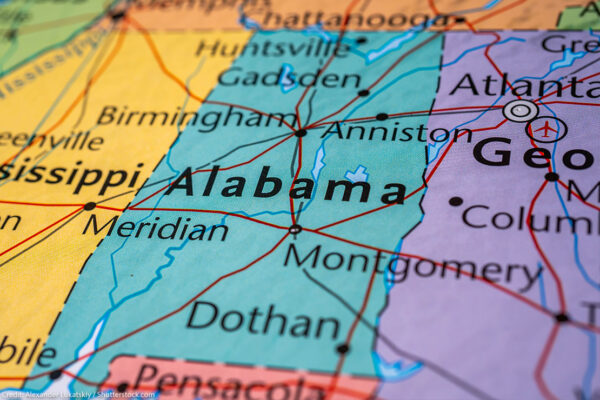The state of Alabama recently adopted new congressional and state legislative districts as the result of its once-in-a-decade redistricting process. These new maps are unconstitutional and grossly gerrymandered in a way that harms Black Alabamians, communities of color, and all Alabamians who care about fair representation. That’s why the ACLU and our partners filed two federal lawsuits today challenging Alabama’s newly drawn state legislative and congressional districts.
Racial gerrymandering occurs when a state uses race as the primary factor in drawing district lines in a way not closely tied to complying with Section 2 of the Voting Rights Act. This often occurs through the practices of “packing” people of color into districts and “cracking” people of color across districts to limit their voting power. “Cracking” refers to splitting communities of color into different districts to prevent them from exercising greater political power. “Packing” refers to placing people of color into the same district in greater numbers than necessary to elect candidates of choice, to prevent people of color from exercising greater political power in surrounding districts.
Using race in drawing district lines can be permissible and indeed necessary in many areas of Alabama to ensure compliance with Section 2, but that was not what the state of Alabama carried out. Rather, the newly drawn maps use race as a means to maintain power.
Alabama’s newly drawn state legislative and congressional districts continue to harm Black Alabamians and other communities of color in several ways. For congressional seats, the new map creates only one district out of seven in which Black Alabamians can elect preferred candidates despite comprising more than 27 percent of Alabama’s voting-age population. It does so by packing a larger number of Black Alabamians into Congressional District 7 than necessary, while cracking other areas of the state with significant Black populations across Congressional Districts 1, 2, and 3.
In the state legislature, the maps pack Black voters into districts in ways that unfairly limit their political power in a number of districts in Jefferson County, Montgomery, Mobile, and Tuscaloosa, while cracking Black communities of interest in Huntsville and Talladega and Calhoun Counties. In majority-minority Jefferson County, where Birmingham is located, the state legislative maps also allow a collective nine districts, all majority white, to cross county lines to change the makeup of the county’s legislative delegation and dilute the power of voters of color.
Alabama’s tactics this cycle are not new. The state carries a sordid record of using racial discrimination to maintain the power its white citizens. While Alabama has made important changes over the past 50 years — most of them in response to court orders or intervention by the U.S. Department of Justice — it has not learned its lesson when it comes to drawing fair and constitutional districts. Even after a three-judge court struck down 12 state legislative districts as unconstitutional racial gerrymanders in the 2010 redistricting cycle, Alabama’s tactics persist.
One reason may be that until 2013, Alabama was covered by a provision in the Voting Rights Act of 1965 that required either the DOJ or a federal court to approve any changes in voting practices, including legislative districts. But the Supreme Court struck down the formula that covered Alabama in 2013 in a case brought by an Alabama county — Shelby County. Lawsuits like this one are necessary to fill that void and prevent the use of discriminatory maps.
Alabamians were kept in the dark throughout a secretive map drawing process, and at the eleventh hour, they were presented with maps that revealed that race was a predominant factor in determining those district lines. The new maps reflect Alabama’s longstanding efforts to use race as means to maintain power through the packing and cracking of Black voters in certain districts, while paying lip service to fair districting by inconsequentially unpacking Black voters in others.
All the people of Alabama, no matter their race, deserve fair state legislative and congressional districts. Redistricting affects representation, and representation affects everything else, from our schools to our health care to our criminal justice system. Alabama’s electoral maps fail to meet the Constitution’s guarantee of equal protection under the laws to citizens of all races, and fail the test of fundamental fairness as well. Alabamians deserve better.


